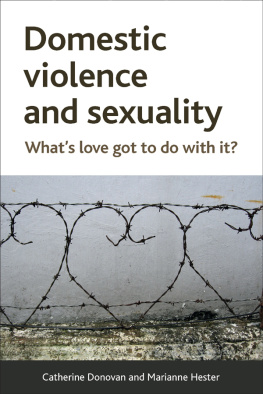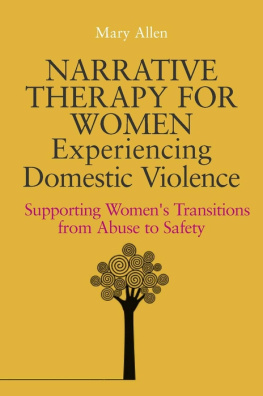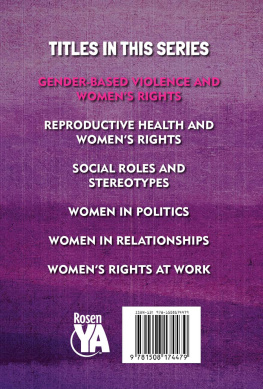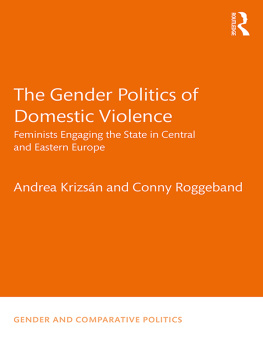Faith in Freedom
Faith in Freedom
Muslim Immigrant Womens Experiences of Domestic Violence
Nafiseh Ghafournia

MELBOURNE UNIVERSITY PUBLISHING
An imprint of Melbourne University Publishing Limited
Level 1, 715 Swanston St, Carlton, Victoria 3053, Australia
mup-contact@unimelb.edu.au
www.mup.com.au

First published 2019
Text Nafiseh Ghafournia 2019
Design and typography Melbourne University Publishing Limited, 2019
This book is copyright. Apart from any use permitted under the Copyright Act 1968 and subsequent amendments, no part may be reproduced, stored in a retrieval system or transmitted by any means or process whatsoever without the prior written permission of the publishers.
Every attempt has been made to locate the copyright holders for material quoted in this book. Any person or organisation that may have been overlooked or misattributed may contact the publisher.
Text design by Phil Campbell
Cover design by Phil Campbell
Front cover photograph Joel Tasche
Typeset by J&M Typesetting
Printed in Australia by OPUS Group

9780522874273 (paperback)
9780522874280 (hardback)
9780522874297 (ebook)
MUP ISLAMIC STUDIES SERIES
The Islamic Studies Series (ISS) is aimed at producing internationally competitive research manuscripts. This series will showcase the breadth of scholarship on Islam and Muslim affairs, making it available to a wide readership. Books in the ISS are based on original research and represent a number of disciplines including anthropology, cultural studies, sociology and political science. Books in the ISS are refereed publications that are committed to research excellence. Submissions on contemporary issues are strongly encouraged. Proposals should be sent to the ISS Editor.
Professor Shahram Akbarzadeh
ISS Editor
Board of Advisors
Associate Professor Syed Farid Alatas
Department of Sociology, National University of Singapore
Professor Howard V. Brasted
Director, UNE Asia Pacific Centre
Emeritus Professor Robert E. Elson
School of History, Philosophy, Religion and Classics, University of Queensland
Professor John Esposito
Director, Prince Alwaleed bin Talal Center for Muslim-Christian Understanding, University Professor of Religion and International Affairs, Georgetown University
Emeritus Professor Riaz Hassan AM, FASSA
ARC Australian Professorial Fellow, Department of Sociology, Flinders University
Professor Robert Hefner
Institute on Culture, Religion and World Affairs, Boston University
Professor Michael Humphrey
Chair, Department of Sociology and Social Policy, School of Philosophical and Historical Inquiry, University of Sydney
Professor William Maley AM
Director, Asia-Pacific College of Diplomacy, Australian National University
Professor James Piscatori
Centre for Arab and Islamic Studies (The Middle East and Central Asia), Australian National University
Professor Abdullah Saeed
Sultan of Oman Professor of Arab and Islamic Studies, Director, National Centre of Excellence for Islamic Studies, University of Melbourne
Professor Amin Saikal AM
Director, Centre for Arab and Islamic Studies (The Middle East and Central Asia), Australian National University
Professor Samina Yasmeen AM
Director, Centre for Muslim States and Societies, School of Social and Cultural Studies, University of Western Australia
I dedicate this book to the fourteen courageous women interviewed for this study
Contents
Acknowledgements
First and foremost, I would like to express my deepest gratitude to the fourteen women who courageously agreed to share their stories and generously gave their time to participate in this study. Particularly, I would like to thank those women who had just left their abusers and experienced much trauma and sadness, but still insisted on being interviewed in the hope of contributing to change in their or other survivors lives. This research could not have been possible without them and their help. They were all amazing, strong and brave women, and each of them will hold a unique place in my heart forever. I cried with them, sat with them for hours, and listened to their stories. This book is dedicated to these survivors, in the hope that these findings will make a difference.
I undertook the research for this book as a PhD student at the University of Sydney. Special thanks to my supervisors, Associate Professor Susan Goodwin, who first suggested I submit a book proposal, and Associate Professor Lesley Laing for their continuous support and encouragement and valuable feedback throughout the various steps in this research. They brought with them an extensive knowledge of the field of domestic violence research and an ability to provide the most direct and honest comments throughout the dissertation process.
I also gratefully acknowledge the financial and administrative support from the University of Sydney, the Faculty of Education and Social Work and the Scholarship Office for its grant through the Australian Postgraduate Award.
I would also like to thank the service providers who contributed to this study. They connected me with others in their networks, referred their clients to participate in the study and provided venues for conducting the interviews. In particular, I am very grateful to two case workers, Ms Miza Torlakovic and Ms Afagh Afaridan, in two migrant resource centres (one in Newcastle and one in Sydney) and one womens refuge manager in Sydney who continuously provided support during the process of data collection and participant recruitment. Their knowledge, experience and compassion have been invaluable resources for me and for the community as a whole.
Special thanks to Melbourne University Publishing staff, and in particular Catherine McInnis who helped through different publication stages of my book, and Vesna Rapajic who did such a great job in editing and changing the work from formal dissertation to a more readable book, ensuring that the womens voices remain intact.
Finally, I would like to acknowledge all of the support and encouragement provided by friends and family members, especially my husband Hamed Hosseini, who supported me through the very difficult moments, always encouraging me to grow and develop intellectually. I am also grateful to my beautiful daughter Ayeh for her patience and fortitude. Also, special thanks to my parents and my two beautiful sisters for all their encouragement and support.
Nafiseh Ghafournia
November, 2018
CHAPTER 1
Introduction and background
Violence against women has pervasive and traumatic effects on all womens lives; for victims from immigrant backgrounds the situation can often be particularly complex. While there is a growing literature that reflects this complexity, much remains unknown about the experiences of abused immigrant women from different cultural and ethnic backgrounds in Australia. Studies examining the experiences of abused Muslim immigrant women in Australia are even more limited. Nevertheless, it is widely acknowledged that cultural values and immigration status can exacerbate the complexities involved in domestic and family violence situations.
Next page







